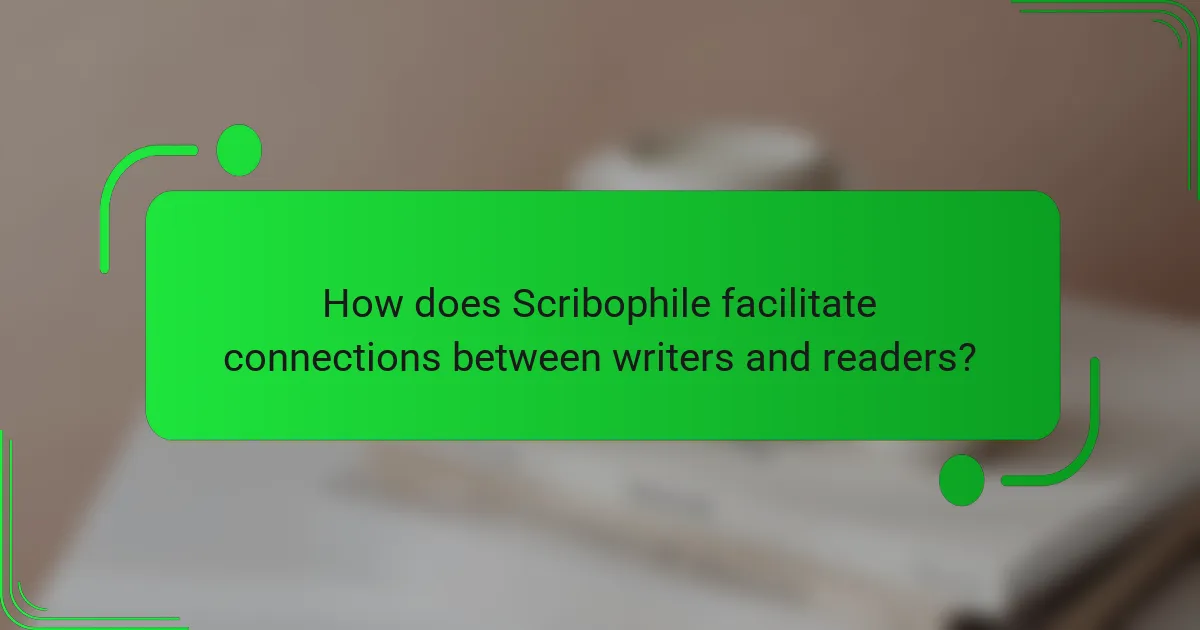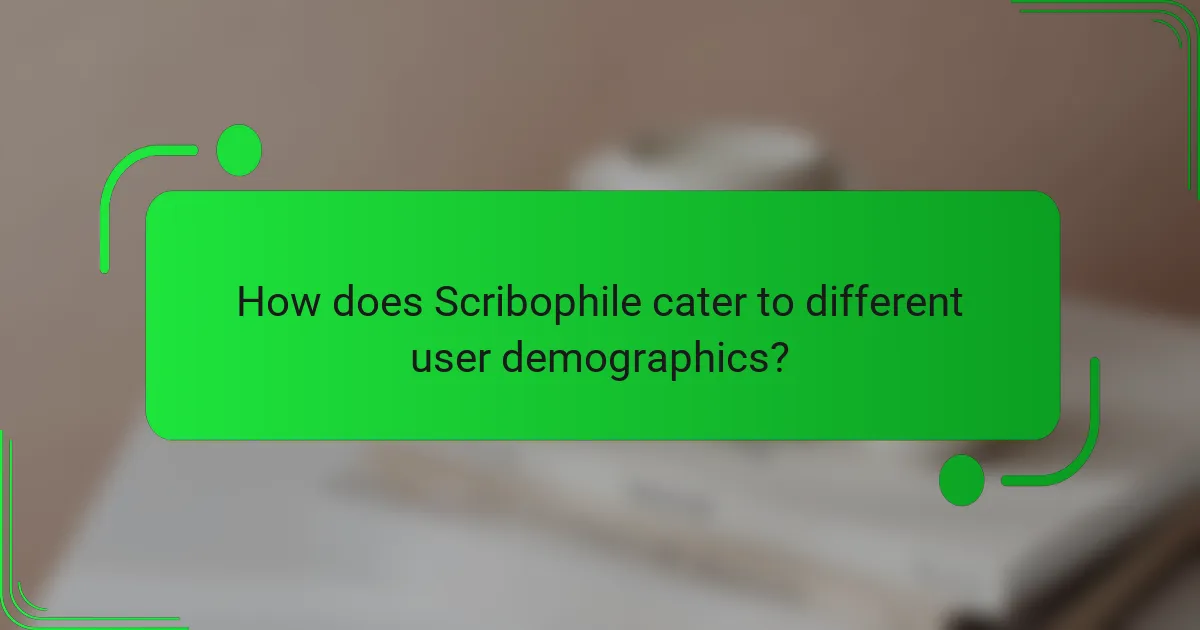Scribophile connects writers and readers by fostering a community for feedback and literature sharing. The platform enhances writers’ skills through structured critiques and accountability. Users benefit from an extensive library of free literature and a supportive environment that encourages collaboration. Engaging with peers leads to improved writing and lasting relationships within the community.

How does Scribophile facilitate connections between writers and readers?
Scribophile connects writers and readers through a platform that fosters feedback and community engagement. Writers can share their work and receive critiques, while readers gain access to diverse literature for free. This interaction enhances skills and builds relationships. The unique attribute of Scribophile is its structured feedback system, which encourages constructive criticism. As a result, both writers and readers benefit from a collaborative environment that promotes growth and creativity.
What features enhance user engagement on Scribophile?
Scribophile enhances user engagement through interactive features and community feedback. Key elements include peer critiques, writing prompts, and a user-friendly interface. These aspects foster collaboration and encourage regular participation. Additionally, the platform’s unique point system rewards users for providing feedback, further incentivizing engagement.
How does feedback work within the Scribophile community?
Feedback within the Scribophile community operates through a structured exchange where writers receive critiques on their work. Members submit pieces for review, and in return, they are expected to provide feedback on others’ submissions. This reciprocal system fosters a supportive environment for writers to improve their skills. The emphasis on constructive criticism helps enhance the quality of writing and builds connections among members. Additionally, the community encourages detailed feedback, which can cover various aspects such as plot development, character depth, and stylistic choices. This process not only aids individual growth but also strengthens the overall literary community.

What are the primary benefits of using Scribophile for writers?
Scribophile offers numerous benefits for writers, primarily enhancing their ability to connect with readers through feedback. Writers gain access to a supportive community, receive constructive critiques, and improve their craft through peer interactions. Additionally, the platform fosters accountability, encouraging regular writing habits. Scribophile’s unique attribute is its extensive library of free literature, allowing writers to explore diverse genres and styles. This resource enriches their understanding of narrative techniques and audience engagement.
How does Scribophile support the development of writing skills?
Scribophile enhances writing skills by providing a platform for writers to receive constructive feedback. This community-driven approach allows users to connect with readers, fostering improvement through peer reviews. Writers can upload their work and receive critiques, which are essential for skill development. The platform emphasizes collaboration, where members engage in discussions about writing techniques and styles. This interaction nurtures a supportive environment that encourages continuous learning and growth in writing proficiency.
Which types of literature are most commonly shared on Scribophile?
Fiction, poetry, and creative non-fiction are the most commonly shared types of literature on Scribophile. Users frequently seek feedback on original stories, poems, and essays. Fiction encompasses genres like fantasy, romance, and science fiction, attracting diverse readers. Poetry varies from free verse to structured forms, showcasing unique voices. Creative non-fiction includes personal essays and memoirs, appealing to those interested in real-life experiences.

How does Scribophile cater to different user demographics?
Scribophile effectively caters to diverse user demographics by offering tailored features for writers and readers. It provides a platform for feedback, enhancing user engagement across age groups and experience levels. For example, novice writers benefit from community support, while experienced authors can refine their skills through critiques. Scribophile’s user-friendly interface appeals to tech-savvy individuals, while its focus on free literature attracts budget-conscious readers. Additionally, the platform fosters inclusivity by encouraging participation from various backgrounds, promoting a rich exchange of ideas and perspectives.
What are the unique needs of writers in the US compared to the UK?
Writers in the US and UK have distinct needs shaped by cultural differences and publishing landscapes. US writers often seek broader commercial opportunities and diverse genres, while UK writers may focus on literary traditions and regional storytelling.
US writers benefit from platforms like Scribophile, which offers extensive feedback and community support, catering to their desire for engagement. In contrast, UK writers often value nuanced critique and literary heritage, influencing their feedback preferences.
Understanding these unique needs enhances the effectiveness of platforms like Scribophile, allowing them to connect with writers across both regions while addressing their specific requirements for literature and feedback.
How do Spanish-speaking users engage with Scribophile?
Spanish-speaking users engage with Scribophile by sharing their writing and providing feedback in a collaborative environment. They benefit from a community that values diverse perspectives and encourages literary growth. Many users participate in writing contests and workshops, enhancing their skills and connecting with fellow writers. This engagement fosters a rich exchange of cultural narratives and experiences.

What role does community play in the Scribophile experience?
Community plays a crucial role in the Scribophile experience by fostering collaboration and feedback. Through peer reviews, writers receive constructive criticism, enhancing their skills and confidence. The community also provides a supportive environment, encouraging creativity and connection among users. Engaging with fellow writers leads to lasting relationships and shared learning opportunities, ultimately enriching the overall writing journey.
How can writers effectively participate in community discussions?
Writers can effectively participate in community discussions by actively engaging with feedback and sharing their work on Scribophile. This platform fosters interaction through constructive critiques, allowing writers to connect with readers and fellow authors.
Engagement strategies include providing thoughtful feedback on others’ work, participating in forums, and joining groups that align with their interests. Writers should prioritize meaningful contributions to discussions, as this builds rapport and encourages reciprocal engagement.
Additionally, setting specific goals for participation, such as reviewing a certain number of pieces weekly, can enhance their presence in the community. By consistently contributing, writers establish themselves as valuable members, leading to deeper connections and insights.
Ultimately, active participation on Scribophile not only improves writing skills but also cultivates a supportive network of peers, enhancing the overall experience of sharing literature.
What are the common challenges faced by new users in the Scribophile community?
New users in the Scribophile community often face challenges such as understanding the platform’s feedback system, navigating the user interface, and engaging effectively with other writers. Many struggle with receiving constructive criticism and integrating it into their work. Additionally, some may find it difficult to balance giving feedback with receiving it, leading to frustration. Building connections with other users can also be daunting, as establishing rapport takes time and effort.

Which unique features set Scribophile apart from other writing platforms?
Scribophile distinguishes itself through its unique features that foster community and enhance the writing experience. Its primary focus on constructive feedback allows writers to receive detailed critiques from peers, promoting growth. The platform’s robust system for exchanging critiques encourages engagement, as users earn points by reviewing others’ work, which they can then use to submit their own writing for feedback. Additionally, Scribophile offers a vibrant community atmosphere through forums and groups, further connecting writers with readers and fellow authors. This combination of feedback mechanisms and community support sets Scribophile apart from other writing platforms.
How does Scribophile’s feedback system differ from traditional critique methods?
Scribophile’s feedback system emphasizes community-driven critiques, contrasting with traditional methods that often rely on one-on-one interactions. Users receive diverse perspectives from multiple readers, fostering a broader understanding of their work. This collaborative approach encourages continuous improvement and engagement, making feedback more dynamic and supportive. Traditional critique methods typically lack this level of interaction, focusing instead on isolated opinions. Scribophile’s system also allows for anonymous feedback, promoting honesty and openness in critiques.
What are the rare opportunities available for writers on Scribophile?
Writers on Scribophile can access rare opportunities such as personalized mentorship, exclusive writing contests, and unique collaboration projects. These experiences foster deeper connections with readers and enhance writing skills through constructive feedback. Engaging with a diverse community also leads to networking opportunities that can elevate a writer’s career.

How can users maximize their experience on Scribophile?
To maximize their experience on Scribophile, users should actively engage with the community, provide thoughtful feedback, and participate in writing workshops. Engaging with fellow writers enhances learning and improves writing skills.
1. Join writing groups to connect with like-minded individuals.
2. Offer constructive feedback on others’ work to build rapport.
3. Submit your own writing for critique to receive valuable insights.
4. Participate in workshops to refine specific skills and techniques.
5. Utilize Scribophile’s resources, such as articles and forums, for additional learning.
By following these steps, users can fully leverage Scribophile’s platform for growth and connection.
What best practices should writers follow when seeking feedback?
Writers seeking feedback should engage actively with their audience, focusing on specific aspects of their work. They should clearly articulate what type of feedback they desire, whether on plot, character development, or writing style. Establishing a constructive environment fosters open communication, encouraging readers to provide honest and helpful critiques. Additionally, responding thoughtfully to feedback can enhance the writer-reader relationship, leading to deeper insights and improvements in writing quality.
Which common mistakes should users avoid on Scribophile?
Users should avoid common mistakes on Scribophile to enhance their experience. Key pitfalls include neglecting to provide constructive feedback, failing to engage with the community, and not following submission guidelines.
1. Provide constructive feedback: Avoid generic comments; instead, offer specific insights to help others improve.
2. Engage consistently: Regular participation fosters connections and increases visibility within the community.
3. Follow submission guidelines: Adhering to guidelines ensures your work is well-received and increases the likelihood of valuable critiques.
4. Be patient with feedback: Understand that receiving responses may take time; avoid frustration and remain open to critique.



